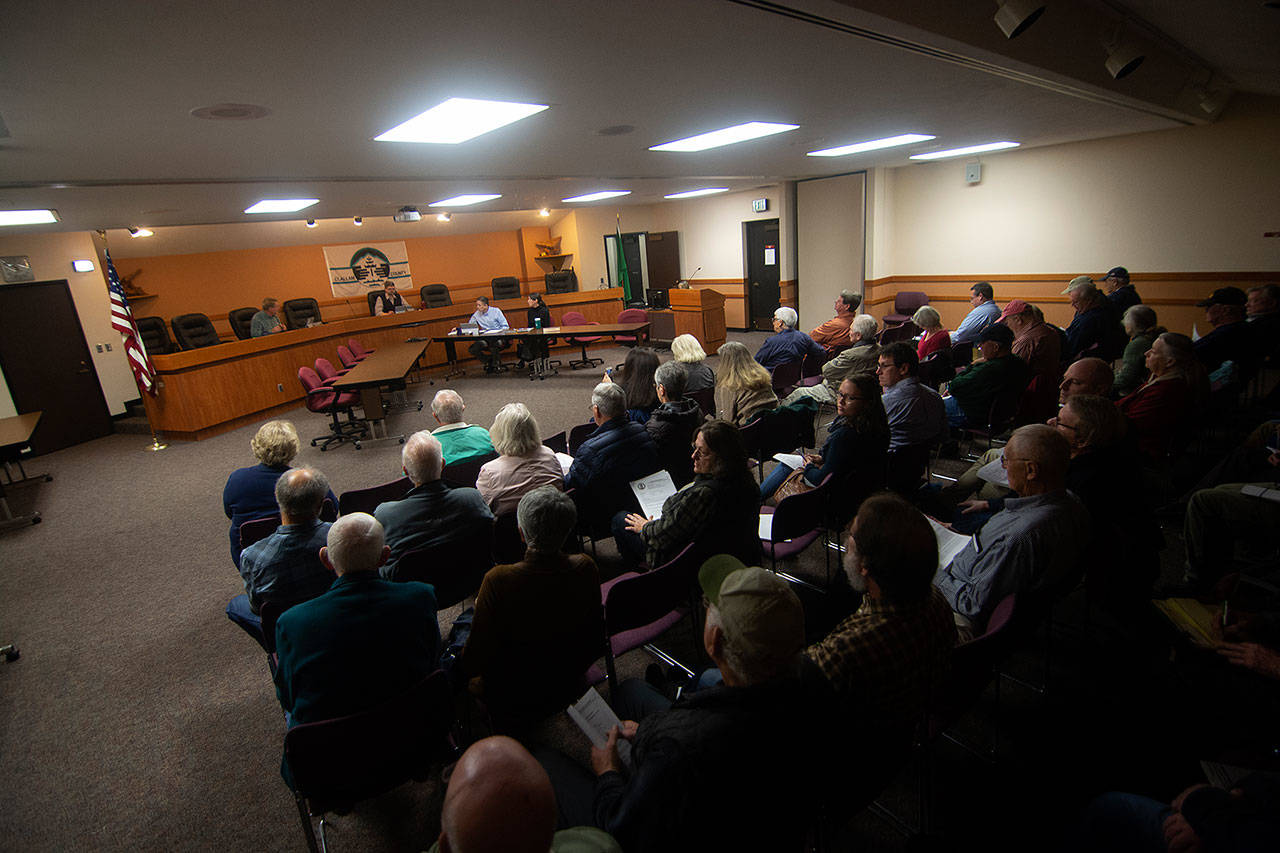PORT ANGELES — Clallam County commissioners decided, after hearing about 90 minutes of public comment Tuesday morning, to rework a proposed property tax that aims to preserve farmland in Clallam County.
Commissioners did not take action Tuesday, but if they approve the Conservation Futures property tax, property owners would be charged $0.0275 per $1,000 assessed value, or about $6.86 a year for a home valued at $250,000.
Commissioners heard from people who don’t trust the tax would be used for preserving farms, from people who would rather see the tax be considered by voters and from people who just don’t want any more taxes.
They also heard from people who want to preserve farmland, which they said provides jobs and food for people in Clallam County. Some cautioned that allowing farmland to be replaced by homes also would increase taxes, due to a rise in needed infrastructure and services.
Commissioners Randy Johnson and Mark Ozias support the ordinance while Commissioner Bill Peach, who attended the meeting by phone Tuesday, said he is preparing to vote against the measure.
The proposed tax is projected to raise about $250,000 per year, which would be used to purchase development rights from willing farm owners. The current draft of the ordinance also allows the tax to be used to protect open space lands, timberland and land with public access to water.
Under state law, the Board of County Commissioners has the authority to pass — without a vote of the people — a property tax to create a fund that is used to purchase development rights to preserve farms, agricultural land, park land, open areas and public access to water.
Commissioner Randy Johnson has said that, according to the U.S. Department of Agriculture, Clallam County has gone from 70,000 acres of farmland in the 1930s to about 17,000 acres of farmland now.
When a land owner receives a payment from the Conservation Future program, that property owner still owns the land and is required to pay property tax. The only restriction is that the land must continue to be a farm.
Realtor Dick Pilling, former chair and present state committeeman of the Clallam County Republican Party, told commissioners that a scarcity of land upon which to build houses is contributing to high housing costs in Clallam County.
“Any time you take land out of use, you aggravate the situation and ultimately contribute to increasing housing crisis and in the end, our homeless population,” Pilling said.
Pilling said he is against using his tax dollars to subsidize farmers and preventing the “best use” of their land.
“This whole deal is to extort money from me, that I really don’t want to give you and that you really don’t need, in order to address a farming problem we really don’t have and further exacerbate the homeless problem we really do have,” Pilling said.
“This idea really ought to be rethunk.”
Jane Vanderhoof told commissioners she paid to extinguish development rights to part of her 56-acre farm in Joyce, protecting salmon habitat in Salt Creek.
She suggested, since commissioners have been hearing from people who oppose increasing property taxes, that maybe they should consider a buyer’s excise tax.
“I agree that nobody likes more taxes, but I think a lot of the people against this proposal are missing the point,” she said. “That point is that we all eat food.”
The conservation easement will ensure that eventually her land will have old growth forest, but will still be able to be farmed and provide produce to sell.
After hearing public comments, commissioners agreed the ordinance needs a little more work. Johnson suggested the commissioners develop language that focuses on protecting farmland.
“I’ve got to tell you there’s an emphasis … and where I started out is I wanted the first priority and first focus to be farmland,” Johnson said.
“If we don’t have that first focus on farmland, then I will have an issue. I agree with some folks who have spoken here.”
Ozias said it is clear that Clallam County is losing farmland and that the current property tax incentives and zoning regulations are not working.
He suggested the commissioners develop more specific language during an upcoming work session, likely this coming Monday. He wanted all commissioners to attend in person.
Peach said he wished the commissioners would be voting on whether to bring the issue to the public for a vote.
“I’m very concerned that the potential exists for monies to be used for uses other than farmland,” Peach said. “Without a language change, I think it’s a real possibility.”
Peach said he is concerned about people who live on a fixed income and that the only room for compromise he sees on the issue is if commissioners reject increasing the general property tax levy by 1 percent this year.
“Either one or the other, but not both,” Peach said. “Consider the people that are living on a fixed income.”
________
Reporter Jesse Major can be reached at 360-452-2345, ext. 56250, or at jmajor@peninsuladailynews.com.

